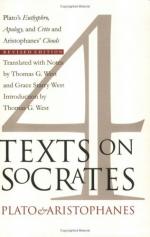
|
| Name: _________________________ | Period: ___________________ |
This test consists of 15 multiple choice questions and 5 short answer questions.
Multiple Choice Questions
1. Which is NOT one of the consequences of breaking a law according to Socrates?
(a) The lessened ability for laws to serve their purpose.
(b) Finality, and the reduction of the threat of retaliation.
(c) Corruption of the soul.
(d) Undermining of general authority.
2. Socrates and Crito agree that the individual should follow what?
(a) Their in-the-moment emotions.
(b) The law.
(c) Popular opinion.
(d) The truth.
3. Aristophanes' portrayal of Socrates would most closely match whose perception of Socrates?
(a) Crito.
(b) The average citizen of Athens.
(c) Plato.
(d) Aristotle.
4. Who is the first person to accuse Socrates of corrupting the youth?
(a) Euthyphro.
(b) Aristophanes.
(c) Plato.
(d) Meletus.
5. Pheidippides recites a text written by which man?
(a) Euripides.
(b) Aristophanes.
(c) Sophocles.
(d) Plato.
6. Which side does Aristophanes take in the conflict with Socrates?
(a) Socrates.
(b) Athens' citizens.
(c) Plato.
(d) His stance is impossible to determine.
7. What do Crito and Socrates agree upon in regards to retaliation?
(a) Retaliation is the law of human nature.
(b) Retaliation is the threat that gives law authority.
(c) One should not retaliate against an evil action with another evil action.
(d) Retaliation is rarely encouraged, but it can be useful.
8. According to The Clouds, what force holds communities and families together?
(a) Intellectual rigor.
(b) A faith in Zeus.
(c) The oracle at Delphi.
(d) Charity.
9. What is the danger of disobeying an unjust law?
(a) You are in danger of impiety.
(b) There is no danger in defying injustice.
(c) Doing so undermines the authority that provides just laws.
(d) Your reputation may suffer unnecessarily.
10. Where does Crito take place?
(a) In prison.
(b) At Plato's home.
(c) In Socrates' school.
(d) In Crito's study.
11. What action does Strepsiades take with regards to Socrates at the end of Clouds?
(a) He murders Socrates.
(b) He beats up Socrates.
(c) He steals all of Socrates' students away to a rival school.
(d) He burns Socrates' institution.
12. Why does Socrates eventually refuse to help Strepsiades?
(a) Socrates turns Strepsiades over to the police.
(b) Strepsiades is too stupid.
(c) Strepsiades does not have the money to pay him.
(d) Socrates finds Strepsiades lacking in morals.
13. Strepsiades' ultimate fear about Pheidippides revolves around which taboo?
(a) Incest.
(b) Murder.
(c) Mental illness.
(d) Cult religions.
14. What is Aristophanes' general attitude toward Socrates?
(a) Friendly.
(b) Indifferent.
(c) Mocking.
(d) Admiring.
15. Which god advises Strepsiades with respect to his faith?
(a) Zeus.
(b) Hephaestus.
(c) Apollo.
(d) Hermes.
Short Answer Questions
1. Who is the god which the majority of Athenians pray to as their primary god?
2. Why is The Clouds so memorable today?
3. What is the origin of the title The Clouds?
4. What is the result of Pheidippides' time with Socrates?
5. How does Socrates end the Crito dialogue?
|
This section contains 532 words (approx. 2 pages at 300 words per page) |

|




